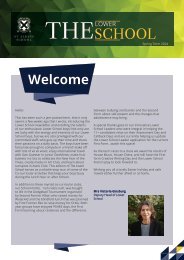You also want an ePaper? Increase the reach of your titles
YUMPU automatically turns print PDFs into web optimized ePapers that Google loves.
18<br />
With that said, how did it actually contribute<br />
to the creation of the State of Israel in<br />
1948?<br />
To briefly recap, the State of Israel was declared<br />
in 1948 following the approval of<br />
the United Nations partition plan by the<br />
General Assembly which had precipitated<br />
a civil war in British Mandatory Palestine.<br />
<strong>The</strong> Partition Plan itself was created at the<br />
request of the British Government who<br />
had concluded in 1937 that its Mandate of<br />
Palestine was untenable due to the conflict<br />
between Jews and Arabs in the region and<br />
– after the Second World War – were<br />
<strong>The</strong> First Prime<br />
Minister of Israel, struggling to control Jewish revolt<br />
David Ben-Gurion over the limits on Jewish migration<br />
to Palestine (especially in the aftermath<br />
of the Holocaust).<br />
One impact of Labor Zionism was that the<br />
radical ‘kibbutznik’ represented a large<br />
group of Jews living in Palestine who<br />
were willing to fight for a state. In fact, the<br />
predecessor to the modern Israel Defence<br />
Forces, the Jewish paramilitary ‘Haganah’<br />
(literally, ‘the defence’) was linked to the<br />
Labor Zionist movement; Haganah was<br />
considered the largest armed force in the<br />
region after the British Army. <strong>The</strong>se paramilitary<br />
groups smuggled weapons into<br />
Palestine and were part of the armed revolts<br />
which proved the British Mandate<br />
untenable. <strong>The</strong>se armed rebellions ultimately<br />
forced the British out, but it is<br />
equally likely that the British would have<br />
been forced to leave anyway; there was an<br />
appetite for self-determination among the<br />
United Nations and the British especially<br />
were not desperate to keep it in their Empire.<br />
However, it is certainly true that the<br />
military wing of the Labor Zionist movement<br />
sped up the British withdrawal.<br />
Nevertheless, the partition would never<br />
have been considered without a viable alternative.<br />
For<br />
the Jewish<br />
State at least,<br />
this came<br />
from the Labor<br />
Zionists.<br />
<strong>The</strong> Kibbutzim<br />
– as well as<br />
‘nomadic’<br />
groups such<br />
as G’dud<br />
HaAvodah<br />
(Labor Battalion)<br />
– created<br />
viable agriculture<br />
and<br />
manual labour<br />
forces<br />
for a future<br />
state; G’dud<br />
HaAvodah notably built roads and drained<br />
swamps in the 1920s where the British had<br />
not. Moreover, the associated labour unions<br />
(mainly Histadrut, that of David Ben<br />
Gurion) began to establish education,<br />
health care and social services for the Jewish<br />
population outside of the kibbutzim<br />
themselves. This created the very beginnings<br />
of the State: one which not only had<br />
some sort of economic output but provided<br />
for its citizens. <strong>The</strong>refore, as a result<br />
of the institutions of Labor Zionism (themselves<br />
a result of the ideology), it was<br />
possible both for the United Nations and<br />
the British government to consider a Jewish<br />
State in the region; after all, there


















